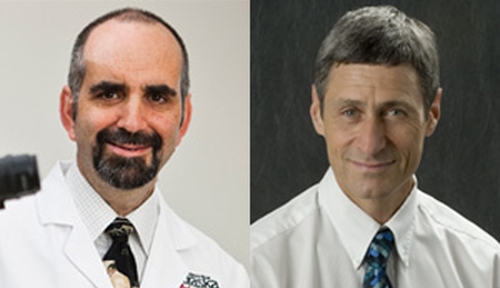University of Iowa neurologist, Matthew Rizzo, M.D., has been selected as the Frances and Edgar Reynolds Professor and Chair of the University of Nebraska Medical Center Department of Neurological Sciences. He also will be named the co-director of the Nebraska Neuroscience Alliance (NNA) joining Howard Gendelman, M.D., chair of the UNMC Department of Pharmacology and Experimental Neuroscience, in that role.
The appointment, which was announced today by Bradley Britigan, M.D., dean of the UNMC College of Medicine, is effective April 1.
A native of Brooklyn, N.Y., Dr. Rizzo earned his undergraduate degree at Columbia University and his medical degree at Johns Hopkins University School of Medicine.
He completed residency training in neurology and fellowships in behavioral neurology and cognitive neuroscience at the University of Iowa. He joined the faculty as an assistant professor and rose to the rank of tenured professor in 1996. He was named director of the Division of Neuroergonomics in 2002 and vice chair of translational and clinical research for neurology in 2007.
An author or co-author of more than 300 scientific articles and several books, Dr. Rizzo’s research focuses primarily on the functional consequences of various neurological disorders. In addition, he has investigated a variety of issues pertaining to home health care, engineering education and human machine interactions.
He was the first to integrate high fidelity driving simulators into clinical settings and has developed some of the most advanced instrumented vehicles to study driver performance.
Funded continuously throughout his academic career by the National Institutes of Health and industry sources, he has served as a neuroscience advisor for the U.S. Army as well as multiple health and medical organizations and governments. He also is a Fellow both in the American Academy of Neurology (F.A.A.N.) and the American Neurological Association (F.A.N.A.).
He was the founding director of the University of Iowa’s campus-wide, multidisciplinary Aging Brain and Mind Initiative (ABMI) in 2010. ABMI includes basic and translational research faculty across five colleges (engineering, public health, medicine, nursing, and liberal arts and sciences) and is dedicated to advancing healthy brain aging and improving health care and quality of life in age and disease.
“We are thrilled to have Dr. Rizzo join us,” Dr. Britigan said. “He’s an outstanding clinician, teacher, and investigator who will bring a wealth of experience and leadership in a wide range of neurological disorders to UNMC. He also has an exceptional track record of interdisciplinary program development which makes him the ideal individual to lead the department and partner with Dr. Gendelman to lead neuroscience at UNMC to the next level.”
Dr. Rizzo said the key subspecialties in the department – stroke, epilepsy, neuromuscular disorders, multiple sclerosis, movement disorders and behavioral neurology – provide a promising nucleus on which to build.
“I am honored to be joining UNMC, a growing institution with progressive leadership and collaborators committed to world-class research, education and neurological care,” Dr. Rizzo said. “We have resources to strengthen existing programs and create new ones with connections across departmental and collegiate silos, institutions and industry.”
He is especially intrigued by the collaborative opportunities that can take place with neurosurgery, psychiatry, pharmacology and experimental neuroscience, nanomedicine and regenerative medicine.
In conjunction with the NNA and other colleagues, Dr. Rizzo plans to bring a number of new faculty to UNMC to expand the area of mind brain health. Formed in 2011, the NNA brings together UNMC’s three top neuroscience programs – the departments of neurological sciences and pharmacology and experimental neuroscience and the Munroe-Meyer Institute.
Joining Dr. Rizzo at UNMC will be Toby Warden, Ph.D., currently in an administrative role with the National Academy of Sciences. She will serve as scientific administrator for neurological sciences and help facilitate neuroscience research growth in the department, the NNA, and throughout UNMC.
